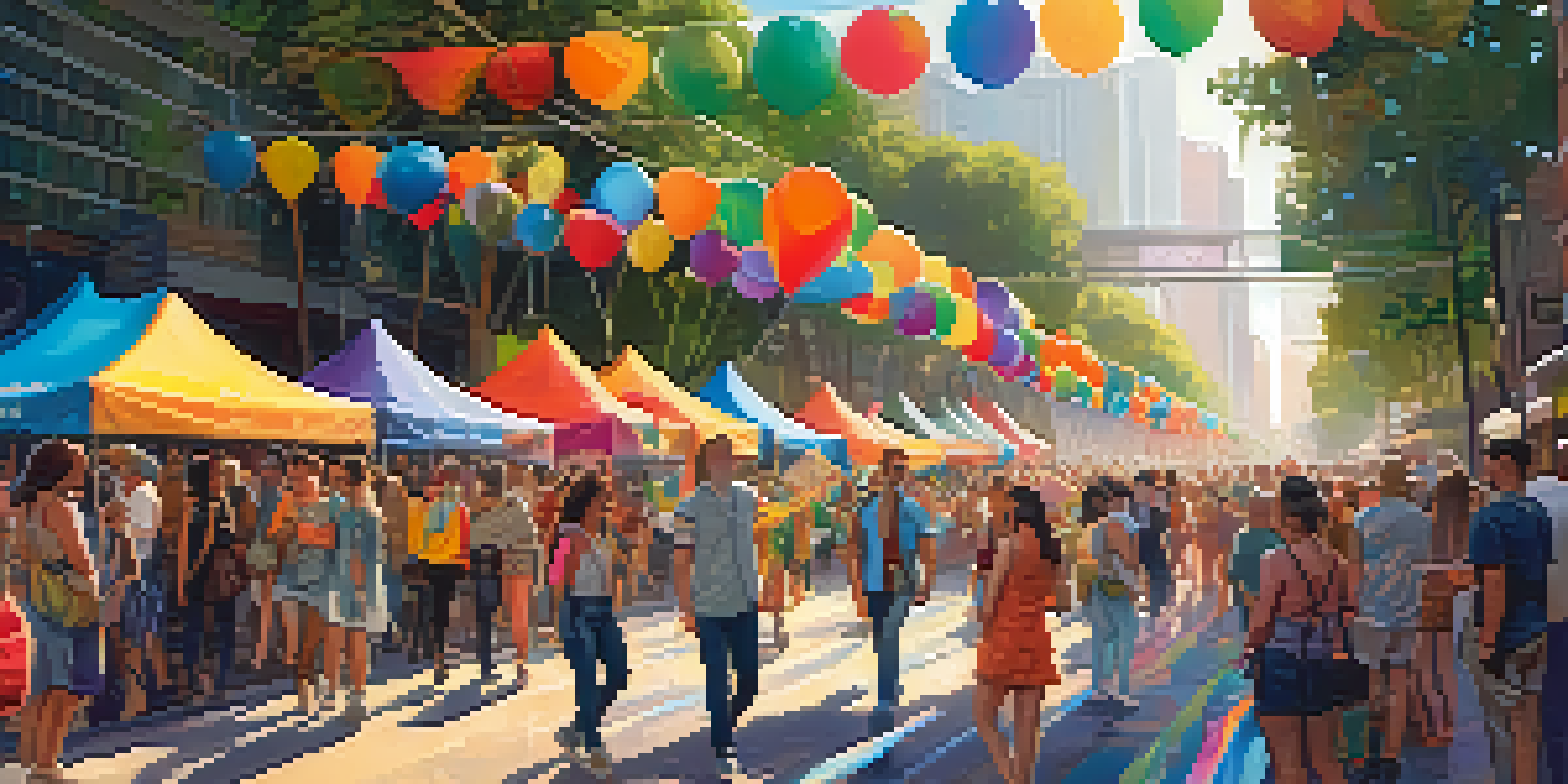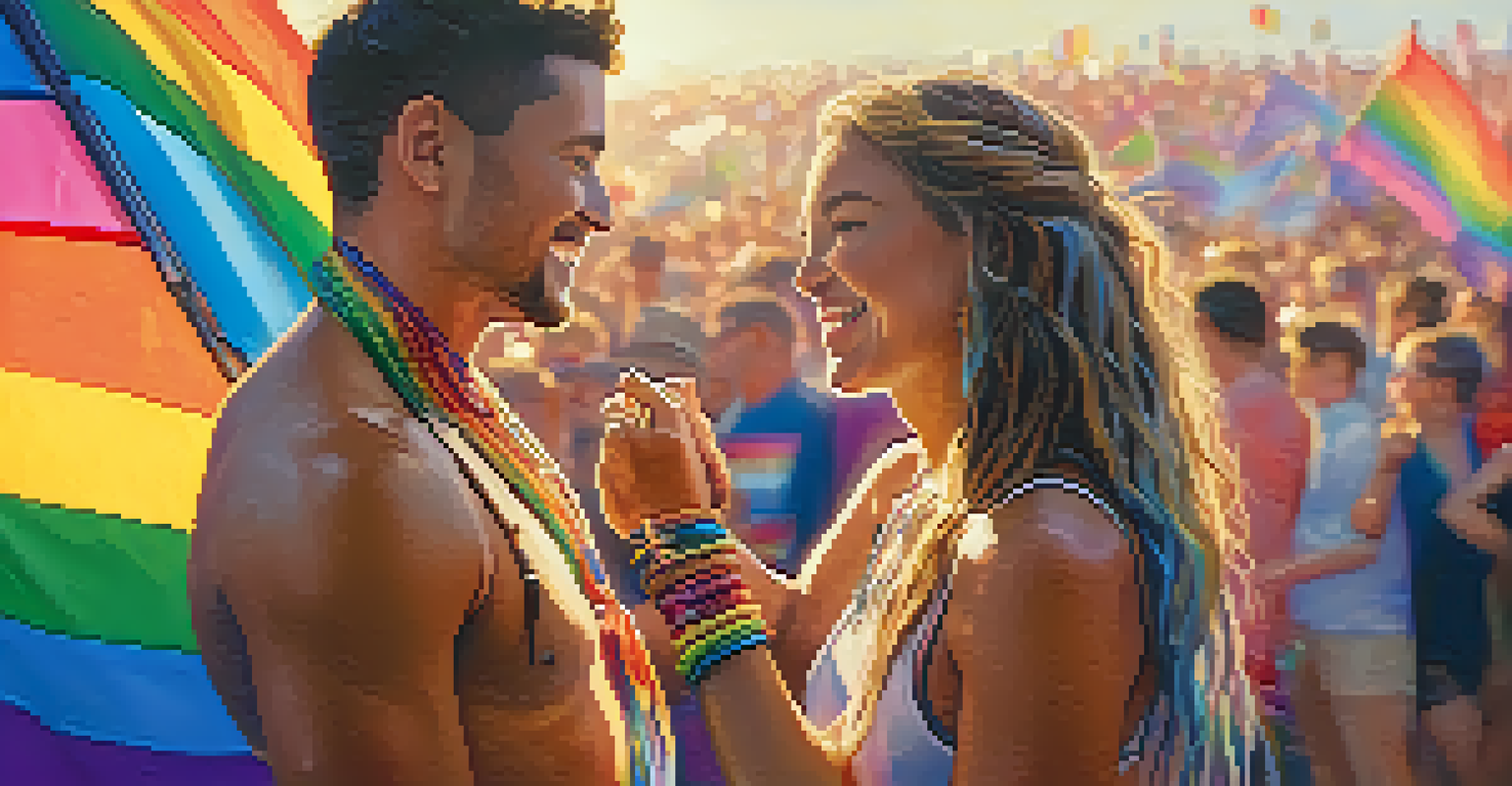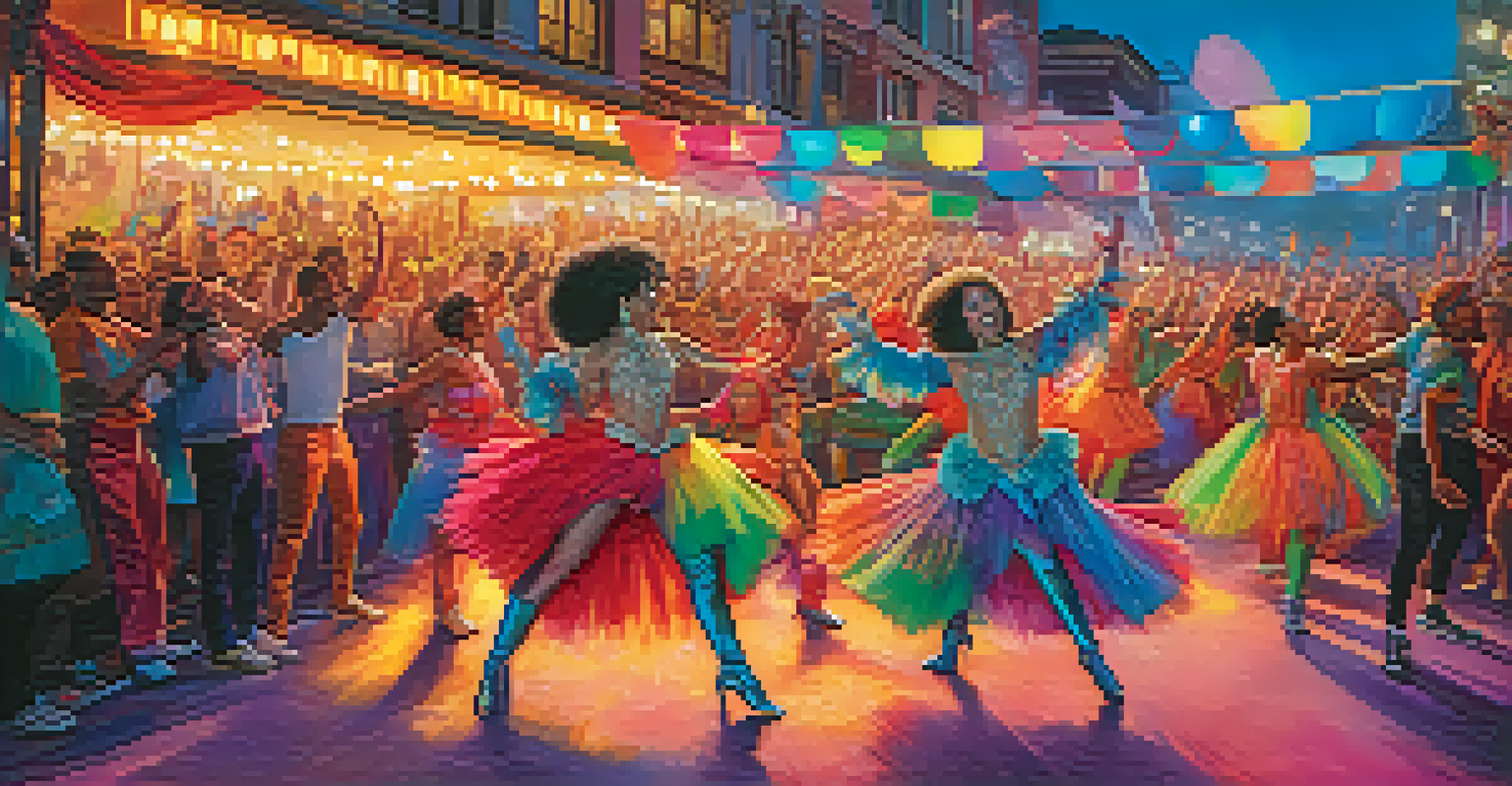The Evolution of LGBTQ+ Festivals in Los Angeles Culture

The Beginnings: A Celebration of Identity and Community
The roots of LGBTQ+ festivals in Los Angeles can be traced back to the early 1970s, a time when the community sought visibility and acceptance. These early gatherings were often small and informal, yet they provided a much-needed space for self-expression and solidarity among individuals who faced societal stigma. Events like the first Christopher Street West parade in 1970 marked a pivotal moment, laying the groundwork for what would become a vibrant and essential cultural phenomenon.
We're all human beings. We all deserve to be treated with respect and dignity, regardless of our sexual orientation or gender identity.
As these celebrations grew, so did their significance. They became not just parties or parades but powerful statements advocating for rights, equality, and inclusion. The energy was palpable, as attendees rallied not only for their own identities but also for those who were marginalized within the LGBTQ+ spectrum. This sense of unity brought with it a renewed sense of hope and purpose, forging strong bonds that continue to resonate today.
Over the years, these festivals evolved into larger, more organized events, attracting diverse crowds and fostering a sense of belonging. They acted as catalysts for change, helping to shift public perception and challenge stereotypes, paving the way for greater acceptance within the broader Los Angeles community.
The Rise of Pride: A Movement Grows in Popularity
By the 1980s and 1990s, LGBTQ+ festivals in Los Angeles began to gain mainstream attention, most notably through the annual LA Pride celebration. This event transformed from a small parade into a massive festival, drawing hundreds of thousands of participants and spectators alike. It became a symbol of resilience and pride, especially as the community faced the devastating impact of the AIDS crisis during this era.

The growth of Pride celebrations mirrored broader societal changes, as more people began to recognize LGBTQ+ rights as human rights. This shift was evident in the increased participation from allies and supportive organizations, further amplifying the message of love and acceptance. Festivals became platforms not only for celebration but also for education, awareness, and activism, addressing pressing issues like health care, marriage equality, and anti-discrimination efforts.
LGBTQ+ Festivals Foster Community
From their inception, these festivals have provided essential spaces for self-expression, solidarity, and advocacy within the LGBTQ+ community.
As the festival scene blossomed, it also reflected the rich diversity of the LGBTQ+ community, showcasing various cultures, identities, and artistic expressions. This inclusivity made Pride a true celebration of love in all its forms, inviting everyone to join in the festivities regardless of their background.
Expanding Horizons: Inclusion of Diverse Identities
The turn of the millennium brought about a renewed focus on intersectionality within the LGBTQ+ festival scene. Events began to recognize and celebrate the unique experiences of marginalized groups within the community, such as people of color, transgender individuals, and non-binary folks. This commitment to inclusivity not only enriched the festival experience but also fostered important conversations about representation and advocacy.
The only thing that stands between you and your dream is the will to try and the belief that it is actually possible.
One notable example is the emergence of festivals like the Trans Pride LA, which specifically highlights the voices and experiences of transgender individuals. These events serve as vital spaces for visibility and empowerment, allowing attendees to share their stories and connect with others who share similar journeys. As more festivals embraced this approach, they became more reflective of the community's diversity, celebrating a wide range of identities and expressions.
The evolution of these festivals also sparked collaborations with various cultural organizations and local businesses, further broadening their impact. By creating partnerships that promote inclusivity, these events have the potential to reach beyond traditional LGBTQ+ audiences, inviting allies and supporters to engage in meaningful ways.
The Role of Technology: Connecting Communities Online
As technology advanced, so did the ways LGBTQ+ festivals connected with their audiences. Social media platforms allowed organizers to promote events more effectively, engage with participants, and share stories that might otherwise go unheard. This digital landscape became a lifeline during challenging times, especially during the COVID-19 pandemic, when many festivals pivoted to virtual formats to keep the community connected.
Virtual events offered a unique opportunity to reach broader audiences, breaking down geographical barriers and allowing participation from individuals who may have felt excluded due to distance or other factors. Online workshops, performances, and discussions created a sense of belonging while still celebrating the spirit of the festivals. This adaptability highlighted the resilience of the LGBTQ+ community, showcasing their ability to innovate and thrive in the face of adversity.
Pride Celebrations Promote Inclusion
As LGBTQ+ festivals evolved, they embraced diversity by recognizing and celebrating the unique experiences of marginalized groups, fostering important conversations about representation.
Moreover, the fusion of technology and festivals paved the way for new forms of expression, such as digital art, virtual reality experiences, and interactive online platforms. These innovations not only enhanced the festival experience but also expanded the narrative of what LGBTQ+ celebrations could look like in the future.
Cultural Impact: Festivals as Agents of Change
LGBTQ+ festivals in Los Angeles have long been more than just celebrations; they are powerful agents of change. These events have influenced public policies, increased awareness about LGBTQ+ issues, and fostered a greater understanding of diverse identities. Through advocacy efforts and community engagement, festivals have played a crucial role in pushing for equality and social justice.
One significant impact is the increased visibility of LGBTQ+ individuals in various spheres, including politics, business, and the arts. Festivals have provided a platform for activists and leaders to share their messages, engage with the public, and inspire action. This visibility not only empowers individuals but also fosters acceptance, helping to dismantle harmful stereotypes and prejudices.
As the festivals continue to evolve, their cultural impact remains profound. They serve as reminders of the struggles faced by the LGBTQ+ community while celebrating the progress made. These events encapsulate a spirit of resilience and hope, inviting everyone to participate in the ongoing journey toward equality.
The Future: Where Do LGBTQ+ Festivals Go From Here?
Looking ahead, the future of LGBTQ+ festivals in Los Angeles seems promising yet challenging. As societal attitudes continue to shift, there remains a need for these celebrations to adapt and respond to the evolving landscape of identity and community. This includes addressing emerging issues such as mental health, safety, and representation, ensuring that all voices are heard and valued.
Moreover, the festivals have the opportunity to expand their outreach, engaging younger generations and fostering intergenerational dialogue. By incorporating the perspectives of youth and marginalized groups, organizers can create more inclusive spaces that reflect the diverse experiences within the LGBTQ+ community. This evolution can help cultivate a sense of belonging that transcends age and background.
Technology Connects LGBTQ+ Spaces
Advancements in technology have transformed the way LGBTQ+ festivals engage with audiences, offering virtual experiences that break down barriers and promote inclusivity.
Ultimately, the future of LGBTQ+ festivals will depend on their ability to remain authentic and true to their roots while embracing change. As they continue to celebrate love, diversity, and acceptance, these events will undoubtedly play a vital role in shaping the cultural landscape of Los Angeles for years to come.
Conclusion: Celebrating Love and Unity
In conclusion, the evolution of LGBTQ+ festivals in Los Angeles has been a remarkable journey filled with resilience, creativity, and community spirit. From their humble beginnings to their current status as vibrant celebrations of love and acceptance, these festivals have left an indelible mark on the cultural fabric of the city. They not only honor the struggles and achievements of the LGBTQ+ community but also invite everyone to join in the celebration of diversity.
As we reflect on this evolution, it's essential to recognize the importance of maintaining the core values that these festivals represent: inclusivity, joy, and solidarity. By fostering a culture of acceptance and understanding, these events contribute to a brighter future for all individuals, regardless of their identity. They remind us that love is universal and that together, we can create a world where everyone feels free to be their authentic selves.

As we look to the future, let's continue to support and uplift LGBTQ+ festivals, ensuring they remain spaces of empowerment, celebration, and community. Whether in person or online, these events will always serve as a testament to the strength and resilience of the LGBTQ+ community, inviting us all to partake in the beauty of unity and love.